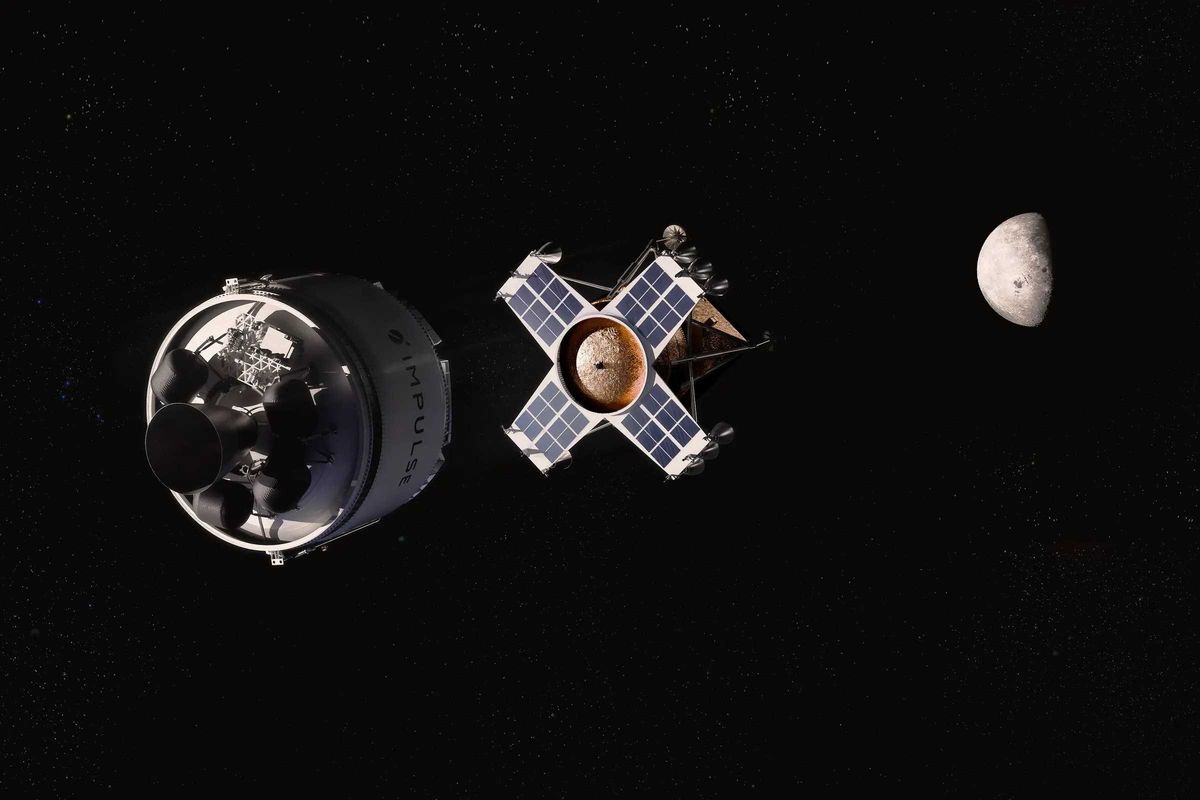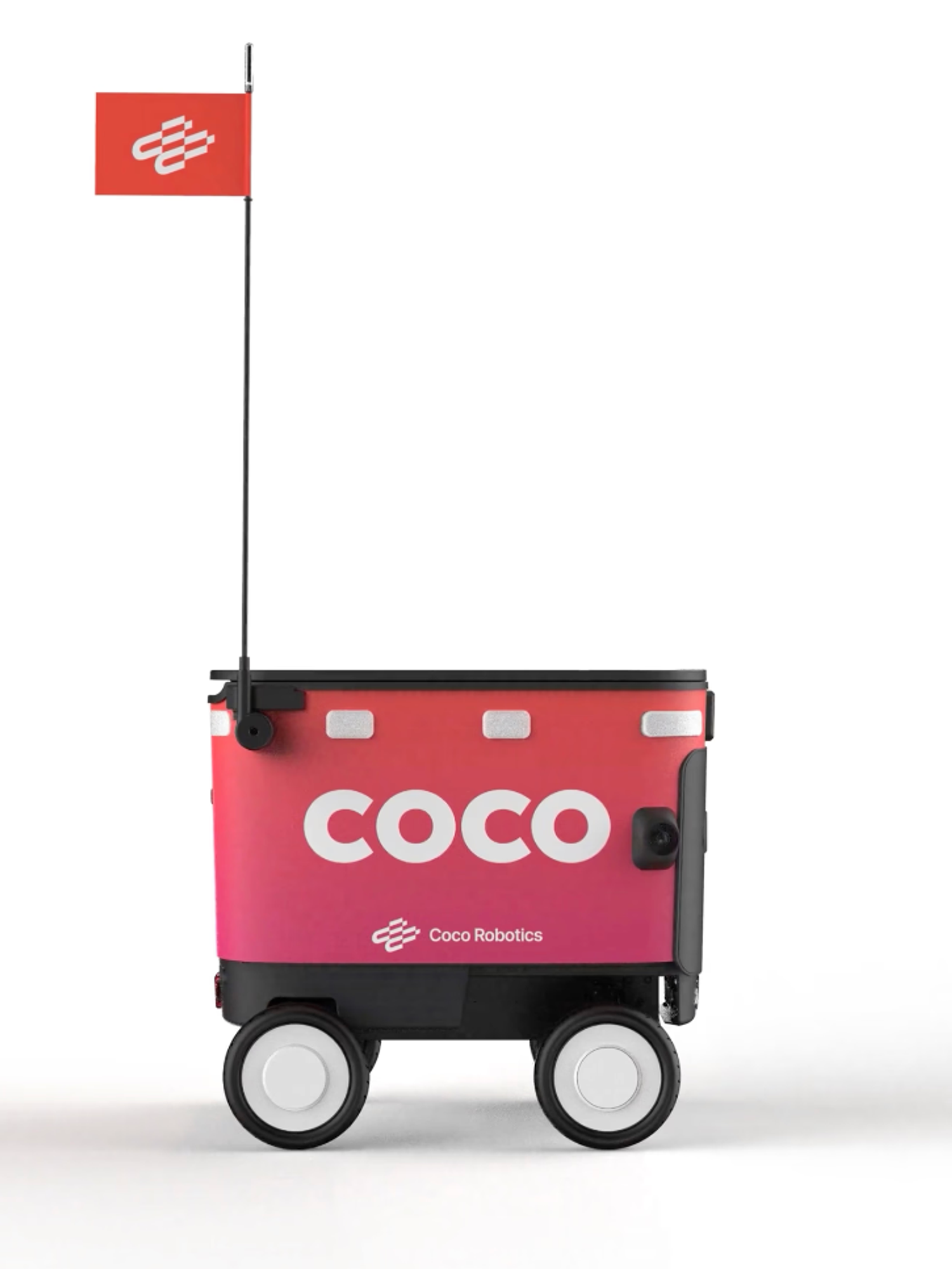

Get in the KNOW
on LA Startups & Tech
XMeet the 10 Startups in Techstars' 2021 Space Accelerator Class
Samson Amore
Samson Amore is a reporter for dot.LA. He holds a degree in journalism from Emerson College. Send tips or pitches to samsonamore@dot.la and find him on Twitter @Samsonamore.
Techstars' Space Accelerator took off this week with its third class of space-related companies that make everything from AI-powered smart cameras to technology that can anticipate celestial collisions.
The 10 startups selected for the competitive four-month program are based across the U.S. and Australia and will work with Techstars on a mostly remote basis.
All are developing technology with multiple uses in space and will receive a $120,000 investment in addition to access to Techstars' expanding network of mentors.
That network includes aerospace experts at the Pasadena-based NASA Jet Propulsion Laboratory. Participating companies include Lockheed Martin, Arrow Electronics, SAIC and Israel Aerospace Industries.
"Alumni from our previous cohorts are launching space systems and infrastructure, raising tens of millions of dollars in venture capital as well as receiving lucrative contracts from both government and commercial customers," said Jonathan Fentzke, the program's managing director.
The program will culminate in a demo day on Sept. 2 where the startups will show off their work in hopes of winning potential investors or clients.
Fentzke noted that while no companies in this year's cohort are based in LA, Techstars still has partners mentors and investors based here.
"As it turns out the four companies in California out of 10 are not based in L.A. today, but will likely have a presence over time," Fentzke told dot.LA.
Here's a look at the 10 companies selected for this year's Techstars Space Accelerator.
Hyperkelp
LOCATION: San Clemente, Ca.
CEO: Graeme Rae
Founded by maritime engineer Dr. Graeme Rae, Hyperkelp is building buoys that aren't your average fishing bobber. Its tech can collect and transmit data about the surrounding ocean and incoming payloads from space. The company says its goal is to create a network of the buoys around the ocean to help aerospace launch companies stream data from anywhere around the world.
Hyperspec.ai
LOCATION: San Francisco, CA. and Tel Aviv, Israel
CEO: Ohad Levi
Hyperspec.ai makes smart cameras that run on artificial intelligence. The company's CEO Sravan Puttagunta previously worked in HP's engineering department. In a nutshell, Hyperspec's cameras are made to create accurate mapping and object tracking in real time, with the goal of being used on self-driving cars and other autonomous vehicles.
Nicslab
LOCATION: Sydney, Australia
CEO: Dr. Andri Mahendra
Nicslab develops technology called the "source measurement system" that uses quantum computing to help organizations optimize their internet speeds and make them faster. Its current clients include the University of Oxford, HP Labs and Mitsubishi Electric.
Pierce Aerospace
LOCATION: Indianapolis, In.
CEO: Aaron Pierce
Pierce Aerospace makes software that helps autonomous drones identify objects and payloads. It argues that this software is critical to the development of the drone industry -- after all, it can be pretty scary if a drone goes rogue because it can't see where it's going. In 2019 the company received a roughly $50,000 grant from the U.S. Department of Defense to continue work on its flagship product, the Flight Portal ID system, which the DoD wants to use on its Unmanned Aircraft Systems.
Pixspan
LOCATION: Rockville, MD.
CEO: Michael Rowny
Pixspan develops a system that lets large files be transferred from different storage locations (like hardware or the cloud) at rapid speeds -- sometimes up to 5 times faster than average, it reports. It's compatible with several app programming interfaces, the main one being Amazon Web Services.
QuSecure
LOCATION: San Mateo, Ca.
CEO: Dave Krauthamer
QuSecure is a security company that focuses on protecting government and corporate systems from hacks. Specifically, its software works to keep encrypted data from being stolen and decrypted by quantum computers, which can steal and read valuable information at rapid speed. Its customers include Google and Amazon.
SCOUT
LOCATION: Alexandria, Va.
CEO: Eric Ingram
Scout -- also known as Scout Space -- develops software that helps spacefaring companies visualize what's going on in the great beyond and avoid casualties, like crashes with other spacecraft, satellites or debris. The company was founded in 2019 and says its name is an acronym for helping Spacecraft Observe and Understand Things around them.
SeaSatellites
LOCATION: San Diego, CA.
CEO: Mike Flanigan
As the name suggests, SeaSatellites is building unmanned vessels that work as satellites for the ocean and have a wide array of potential uses, from environmental data collection to communications. Similar to their skyward counterparts, SeaSatellites' tech can be controlled from anywhere and are designed to carry payloads on long missions.
Xairos
LOCATION: Denver, CO.
CEO: David Mitlyng
This company's name is Greek to us -- literally. A nod to the Greek god of opportune time, Kairos, is an appropriate name for this startup using quantum mechanics to bring GPS-type technology to areas of the globe without internet access.
Thermexit
LOCATION: Boston, MA.
CEO: Katie Willgoos
Thermexit is the only company in this year's Space Accelerator cohort that's led by a woman. CEO Katie Willgoos joined the company in March and helps the company create and sell its main product, Theremexit Pads, which are tiny thermal sensing sticky pads that can be placed on circuit boards and inside computers.
Correction: An earlier version of this post stated this is Techstars' second space accelerator cohort. It's the accelerator's third such class. It also, misnamed the CEO of Hyperspec.ai.
From Your Site Articles
- Techstars Starburst Space Accelerator Demo Day is Wednesday ... ›
- New Techstars Anywhere Accelerator Class has LA Company - dot.LA ›
- Here is Techstars' Starburst Space Accelerator Class - dot.LA ›
- Event: Demo Day For The Long Beach Accelerator's 2nd Cohort - dot.LA ›
- Techstars Gears Up for Its 2021 Los Angeles Startup Showcase - dot.LA ›
- Kairos Ventures’ Alex Andrianopoulos on Investing in Academia - dot.LA ›
- These SoCal Startups Get Ahead of the Game Via Comcast’s Sports Tech Accelerator - dot.LA ›
- Long Beach Accelerator Set to Welcome Fourth Group of New Companies - dot.LA ›
- NASA’s Space Accelerator Program Lifts Off - dot.LA ›
Related Articles Around the Web
Samson Amore
Samson Amore is a reporter for dot.LA. He holds a degree in journalism from Emerson College. Send tips or pitches to samsonamore@dot.la and find him on Twitter @Samsonamore.
https://twitter.com/samsonamore
samsonamore@dot.la
In the new television landscape where streaming services like Disney Plus, Apple TV and Netflix dominate, Southern California's flagship PBS stations announced Tuesday a rebranding effort that includes new logos and a redesign of its websites as they shift their focus toward streaming.
A third of PBS SoCal and KCET's viewers are streaming shows rather than watching them on traditional television, part of a larger trend where about 80% of U.S. consumers subscribe to at least one paid streaming video service, according to Deloitte. Twenty-five million households have cut the cord since 2012, CNBC reported last year.
The redesign is aimed at attracting more viewers to their streaming services. With this shift, PBS SoCal and KCET are preparing for a "digital future," in order to compete with streaming service providers.
"Broadcast will continue to be a significant portion of our viewing, but as people are migrating to streaming devices as their primary entry point for entertainment, we will be there," Dan Ferguson, Public Media Group of Southern California's senior vice president of marketing and communications, said in an interview.
The redesign moved the organization's websites to the same content management system, making it easier to share content and streamline the process for those who manage them.
The company hopes the new websites will be more customized with easier search and navigation tools, making it easier for viewers to find and watch what they're looking for.
Ferguson said the company launched a campaign to drive awareness to its app when the pandemic hit and that downloads have since been "really healthy."
PBS SoCal and KCET merged two years ago along with satellite service Link TV to establish the Public Media Group of Southern California, which is available to 18 million viewers. Ferguson hopes the rebranding will solidify brand unity among the three channels.
Although it is undergoing a rebranding effort, the company remains committed to its mission of public service in the areas of education, arts and culture, news and diversity and inclusion, Ferguson said.
"As we head into a new year, it is important to remember that although the looks of both PBS SoCal and KCET are changing, our mission remains the same: to strengthen the civic fabric of Southern California while sharing diverse perspectives and providing an essential connection to a wider world," Public Media Group of Southern California President and CEO Andrew Russell said in a news release.
PBS SoCal airs PBS programming and focuses on educational programming for children and families, while KCET specializes in arts, culture and local news.
While the company said its local TV broadcast stations will "continue to be as vital as ever," the effort signals its commitment to on-demand, digital content through streaming, apps, social media and other means.
The marketing campaign, called "You Happen Here," started airing on PBS SoCal and KCET and will include on-air promo spots, website messaging, membership communications and social media posts in the coming months.
The new graphics and colors are meant to reflect the "hues of Southern California."
PBS SoCal's rebranding keeps its relationship to the PBS national brand while "bringing in a unique Southern California feeling." The logo keeps the PBS blue, but introduces coral as the new signature color.
KCET's new logo has a vibrant yellow color that "embodies Southern California values of illumination, inclusion and exploration," the company said.
Related Articles Around the Web
Read moreShow less
Sarah Favot
Favot is an award-winning journalist and adjunct instructor at USC's Annenberg School for Communication and Journalism. She previously was an investigative and data reporter at national education news site The 74 and local news site LA School Report. She's also worked at the Los Angeles Daily News. She was a Livingston Award finalist in 2011 and holds a Master's degree in journalism from Boston University and BA from the University of Windsor in Ontario, Canada.
LA Tech Week: Final Days • Coco’s bots, Anduril’s helmet AI, Impulse’s moon freight
08:05 AM | October 17, 2025
🔦 Spotlight
Happy Friday Los Angeles,
Founders are closing out Tech Week, robots are getting a new research brain, space logistics are taking shape, and defense tech just moved mission command into a helmet.
Anduril’s EagleEye: mission command, heads up

Anduril introduced EagleEye, a helmet mounted system that puts maps, comms, sensor fusion, and on device AI directly in a warfighter’s line of sight, integrated with the Lattice stack. The goal is simple: less time looking down at a tablet and more decisions made at the edge.
Impulse Space: a practical path to lunar deliveries

Impulse outlined a two piece ride to the Moon. Its Helios stage ferries an Impulse built lander to lunar orbit in about a week, the lander detaches, then descends to the surface without in-space refueling. The company says each mission could carry about three tons and that starting in 2028 it could run two missions per year for roughly six tons total, filling the gap between today’s small CLPS deliveries and future heavy landers.
Coco Robotics: new lab, new chief AI scientist

Coco named UCLA’s Bolei Zhou chief AI scientist and is launching a physical AI research lab to turn years of curbside driving data into faster, more autonomous sidewalk deliveries. Expect quicker iteration from data collection to local models on the bots.
LA Tech Week: last three days
We are down to the final few days of LA Tech Week 2025. If you are still slotting meetings or panels, use the rundowns to plan your route:
Scroll for the most recent LA venture deals, funds, and acquisitions.
🤝 Venture Deals
LA Companies
- Second Nature, an AI role-play training platform for sales and service teams, raised $22M Series B led by Sienna VC with participation from Bright Pixel, StageOne Ventures, Cardumen, Signals VC, and Zoom (also a customer). The company will use the funding to expand operations and advance its platform, which generates AI-driven practice scenarios and feedback for enterprise clients like Oracle, Zoom, Adobe, Teleperformance, and Check Point. - learn more
- Pelage Pharmaceuticals, a Los Angeles–based biotech developing regenerative treatments for hair loss, raised a $120M Series B co-led by ARCH Venture Partners and GV. Participants include Main Street Advisors, alongside Visionary Ventures and YK Bioventures; proceeds advance PP405, a topical small molecule that reactivates dormant hair-follicle stem cells, toward Phase 3 in 2026 following positive Phase 2a data. - learn more
- Launchpad, an AI-first robotics company for factory automation, raised an $11M Series A to speed product development and meet demand across the U.S., U.K., and Europe. The round was co-led by Lavrock Ventures and Squadra Ventures, with participation from Ericsson Ventures, Lockheed Martin Ventures, Cox Exponential, and the Scottish National Investment Bank; it follows $2.5M in grant funding from Scottish Enterprise. - learn more
- Mythical Games raised a Series D round, with a strategic investment from Eightco Holdings alongside ARK Invest and the World Foundation. The partnership focuses on human verification and digital identity in gaming, tapping Worldchain/Worldcoin’s Proof-of-Human infrastructure. The transaction is expected to close the week of October 20. - learn more
- Electric Entertainment, the L.A. studio behind “Leverage,” “The Librarians,” and “The Ark,” secured a $20M investment from Content Partners Capital. The funding follows CPC’s launch of an investment arm in April 2024 and is aimed at supporting Electric’s growth across production and distribution. - learn more
- Everyset raised $9M to launch Background Payroll, a SAG-AFTRA approved platform that automates timecards and payroll for background performers, including overtime, penalties, and premiums. The round was led by Crosslink Capital and Haven Ventures, and the company says studios such as Netflix, CBS, Apple TV, Sony, and Amazon already use its tools as it expands into fully integrated background payroll. - learn more
- TORL Biotherapeutics raised $96M in Series C funding to advance TORL-1-23, its Claudin-6 targeted antibody-drug conjugate, through a pivotal Phase 2 study in platinum-resistant ovarian cancer and into a confirmatory Phase 3 program. The company also reported that updated Phase 1 data for TORL-1-23 will be presented at ESMO 2025, bringing total funding since its 2019 founding to more than $450 million. - learn more
- The Plug, a plant-based liver health brand, raised $5M in a venture round of equity and debt to fuel marketing and retail expansion after rolling out its Pill Jar in June and entering all Total Wine & More locations nationwide in September. The company is keeping the round open for additional strategic investors and says it recently hit its first profitable month, is pursuing a partnership with a $500 million nutrition telehealth company, and is targeting a 40% boost to gross margins through a new operational milestone. - learn more
LA Venture Funds
- Clocktower Technology Ventures participated in MGT’s $21.6M Series B, an oversubscribed round led by Mubadala Capital with Tacora Capital and existing backers also joining. The AI-native commercial P&C neo-insurer for small businesses will use the capital to accelerate R&D, deepen vertical AI capabilities, and expand its E&S initiatives nationwide. - learn more
- M13 participated in Daylight’s $75M financing, which combines $15M in equity led by Framework Ventures with a $60M project facility led by Turtle Hill Capital. Daylight is building a decentralized energy network that turns homes into mini power plants via a subscription model and crypto-enabled incentives, aiming to lower costs and dispatch battery power back to the grid. - learn more
- Presight Capital co-led Peptilogics’ $78M Series B2, with Beyond Ventures participating, to fund a Phase 2/3 pivotal trial of zaloganan (PLG0206) for prosthetic joint infections. The raise brings Peptilogics’ total equity financing to about $120M and positions the company to begin the pivotal program in late 2025, pending approvals. - learn more
- Patron participated in Ego AI’s $6.7M seed round to help the YC-backed startup launch human-like AI characters for games via its new character.world engine. The round also included Y Combinator, Accel, and Boost VC, and the capital will support research on Ego’s proprietary model, which combines small language models with reinforcement learning, plus partnerships in Singapore to scale compute and development. - learn more
- Untapped Ventures participated in Woz’s $6M seed round, joining Cervin Ventures (lead), Y Combinator, Burst Capital, MGV, and the Lacob family. The funding will help Woz scale its platform that blends agentic AI with expert human oversight to deliver production-ready mobile apps for enterprises. - learn more
- Perseverance Capital participated in Kailera Therapeutics’ $600M Series B, which was led by Bain Capital Private Equity. The funding advances KAI-9531, an injectable dual GLP-1/GIP agonist, into global Phase 3 trials by year end and supports a broader pipeline of oral and injectable obesity therapies. - learn more
- March Capital participated in Lila Sciences’ $350M Series A, which lifts the company’s total funding to $550M. The capital will scale Lila’s AI Science Factories and commercialize its “scientific superintelligence” platform for partners across materials, energy, and biopharma. - learn more
- Mucker Capital participated in Pear Suite’s $7.6M Series A, which was co-led by Rock Health Capital and Nexxus Holdings. The L.A. based company equips community health workers with an AI-powered platform and provider network, and it will use the funding to expand product development, grow its network, and support new Medicaid and Medicare health plan contracts. Other investors include Enable Ventures, The SCAN Foundation, Acumen America, Impact Engine, and the California Health Care Foundation. - learn more
- Upfront Ventures participated in Renew’s $12M Series A, which was led by Haymaker Ventures with Goldcrest Capital and several Renew customers also investing. Renew’s AI-powered resident retention platform helps apartment operators automate renewals and prevent fraud, and the company says the new funding will scale the product and launch what it calls the industry’s first Resident Referral Network. - learn more
- Acre Venture Partners co-led Ascribe Bio’s oversubscribed $12M Series A with Corteva to scale its natural crop protection platform and launch Phytalix, a broad spectrum “biofungicide without compromise.” The funding advances Ascribe’s small molecule technology derived from the soil microbiome toward commercial rollout, with participation from Syngenta Group Ventures, Trailhead Capital, Silver Blue, Cultivation Capital, and others. - learn more
- Alexandria Venture Investments participated in Tr1X’s $50M financing, announced alongside FDA clearance of the IND for TRX319, an allogeneic CAR-Tr1 Treg cell therapy for progressive multiple sclerosis. The funding extends Tr1X’s runway into 2027 and supports a Phase 1/2a dose-escalation trial slated to start in early 2026, while the company continues its TRX103 studies in Crohn’s disease and other indications. - learn more
- LFX Venture Partners participated in FleetWorks’ $17M funding, which supports the launch and expansion of its “always-on” AI dispatcher for the U.S. trucking industry. The round was led by First Round Capital with participation from Y Combinator and Saga Ventures, and the company says the capital will go toward hiring, commercial rollout, and product development. FleetWorks’ platform automates freight matching between carriers and brokers to speed up bookings and reduce manual calls, emails, and texts. - learn more
- Clocktower Technology Ventures participated in Yendo’s $50M Series B. The fintech behind a vehicle-secured credit card will use the funding to expand its AI credit platform toward an inclusive digital bank that taps “trapped” consumer equity, aiming to unlock up to $4 trillion from assets like cars and homes for underserved borrowers. - learn more
- Alpha Edison participated in TransCrypts’ $15M seed round. The company builds a blockchain-based verified-credentials platform to fight AI-driven fraud and plans to expand beyond employment verification into health and education records. - learn more
- Alexandria Venture Investments participated in Nilo Therapeutics’ $101M Series A, which launched the company to develop medicines that modulate neural circuits to restore immune balance in disease. The round was led by The Column Group, DCVC Bio, and Lux Capital; Nilo also appointed Kim Seth, Ph.D., as CEO and plans to build out New York labs and advance preclinical programs. - learn more
- Chapter One participated in Glue’s $20M Series A. Glue builds an “agentic team chat” platform that embeds MCP-powered AI directly in workplace messaging, with 35 in-app integrations and support for thousands more via custom MCP servers. The funding will help expand product development and infrastructure as Glue pushes this model to more teams. - learn more
- StillMark participated in Meanwhile’s $82M raise, backing the Bermuda-regulated bitcoin life insurer as it expands bitcoin-denominated savings, retirement, and life insurance products for individuals and institutions. The round was co-led by Bain Capital Crypto and Haun Ventures with participation from Apollo, Northwestern Mutual Future Ventures, and Pantera Capital, and brings Meanwhile’s 2025 funding to $122 million after an earlier $40 million Series A. - learn more
- Blue Bear Capital co-led Energy Robotics’ $13.5M Series A with Climate Investment. The Darmstadt-based company provides AI software that lets robots and drones autonomously inspect critical infrastructure, and it will use the funding to scale deployments across energy, chemical, industrial, and utility sites. Customers already include majors like Shell, BP, BASF, Merck, and E.ON, and the company reports more than one million inspections completed to date. - learn more
- B Capital participated in EvenUp’s $150M Series E, which values the AI legal-tech company at over $2 billion. EvenUp builds AI tools for personal-injury law firms and plans to use the new capital to scale its platform and product suite; the round was led by Bessemer Venture Partners, with investors including REV (LexisNexis) and others. - learn more
- WndrCo participated in Zingage’s $12.5M seed round to build an AI care-delivery platform for home-based healthcare. Zingage is rolling out “Operator,” which automates scheduling, staffing, billing, and compliance for home care agencies, and “Perform,” which boosts caregiver retention, with the new capital supporting product expansion and go-to-market. The round was led by Bessemer Venture Partners with additional investors including TQ Ventures and South Park Commons. - learn more
- Alexandria Venture Investments participated in AeroRx Therapeutics’ $21M Series A, which was led by Avalon BioVentures with Correlation Ventures also investing. The funding advances AERO-007, a first-in-class nebulized LABA/LAMA for COPD, into late-stage clinical development aimed at patients who struggle with handheld inhalers. - learn more
- Alexandria Venture Investments participated in Affinia Therapeutics’ $40M Series C, alongside lead investor NEA and new investor Eli Lilly, to advance its AAV gene therapy pipeline. Proceeds will fund an IND submission in Q4 2025 and initial clinical work for AFTX-201 in BAG3 dilated cardiomyopathy, with a Phase 1/2 trial targeted for Q1 2026. - learn more
- Clocktower Ventures participated in Vycarb’s $5M seed round, which was led by Twynam with participation from MOL Switch, Hatch Blue, Idemitsu, and SGInnovate. The Brooklyn startup develops sensor-driven, water-based carbon capture and storage systems that convert CO₂ into stable bicarbonate, with the new funding aimed at scaling deployments at industrial sites. - learn more
LA Exits
- Empaxis Data Management was acquired by Communify, which is integrating Empaxis’ custodial and accounting data connections and operations expertise into its financial AI platform. The aim is to remove fragmented data so wealth and asset managers can deploy MIND AI apps like Client Stories and Portfolio Stories more quickly with cleaner, unified data. Communify also cites pre-integrations with over 175 market-data vendors to speed rollouts. - learn more
- TrueCar is being acquired by founder-led Fair Holdings (Scott Painter) in an all-cash deal at $2.55/share (~$227M), with Painter set to return as CEO. A 30-day go-shop runs through Nov. 13, 2025; largest holder Caledonia supports the acquisition, which is expected to close Q4 2025 or early 2026 pending approvals. - learn more
- Kate Somerville Skincare was acquired by Rare Beauty Brands, as Unilever moves to divest the prestige label it has owned for a decade. The deal includes the skincare and body-care lines as well as the brand’s Melrose Place clinic in Los Angeles; terms weren’t disclosed and closing is expected in Q4 2025 pending approvals. - learn more
- 3GC Group was acquired by Pandoblox, combining 3GC’s enterprise IT operations and cybersecurity services with Pandoblox’s Themis AI data platform to form a unified, AI-ready data and IT operations offering for mid-market companies. The deal aims to solve fragmented data and IT workflows so growing businesses can get enterprise-grade intelligence, security, and support through a single partner. - learn more
- The Free Press was acquired by Paramount, and co-founder Bari Weiss will become editor in chief of CBS News as part of the deal. Paramount says the move pairs CBS News’ scale with The Free Press’ voice, with Weiss reporting to CEO David Ellison and working to “modernize” the brand. - learn more
Read moreShow less
RELATEDTRENDING
LA TECH JOBS



